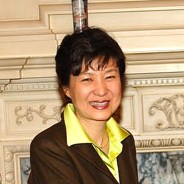Park Geun-hye’s term as South Korean president begins at a time of serious tension on the Korean Peninsula, with North Korea defying international pressure and going ahead with a nuclear test earlier this month. During her campaign, Park had said that as president she would work to mend ties with Pyongyang, which had deteriorated under the government of now-former President Lee Myung-bak, and develop a mutually beneficial partnership that would pave the way for eventual reunification. But along with complications caused by North Korea’s third nuclear test and a general climate of discord, the composition of Park’s government will make an improvement in relations unlikely.
Park, sworn in Monday, had said during the campaign that her North Korea policy would be based on a concept she referred to as “trustpolitik,” whereby the Seoul government would work to build trust with Pyongyang through dialogue and engagement, while also expanding South Korea’s defense capabilities. Introducing the concept in a 2011 article in Foreign Affairs, Park wrote, “North Korea must keep its agreements made with South Korea and the international community to establish a minimum level of trust, and second, there must be assured consequences for actions that breach the peace. To ensure stability, trustpolitik should be applied consistently from issue to issue based on verifiable actions, and steps should not be taken for mere political expediency.”
After the Feb. 12 nuclear test, however, any plans for engagement were thrown into serious doubt before they could even be tried. In the immediate aftermath of the apparently successful nuclear test, it would be politically impossible for Seoul to make any overture to Pyongyang, which in going ahead with the test displayed contempt for the idea of further engagement. Speaking of the test on the day it was carried out, Kim Jang-soo, who will be Park’s top presidential security aide, said, “Things will not be the same as before.” On Feb. 21, Park’s team announced major increases in defense spending, with the stated intention of responding to the North Korean threat.

